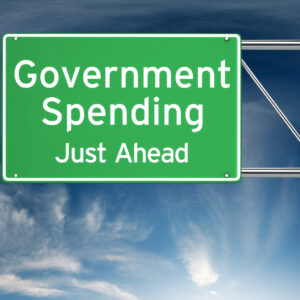In 2018, all federal appropriation bills (with bipartisan support) have passed out of their respective committees. Even more stunning, many of these bills have actually passed the House and Senate. No wonder folks in Washington are congratulating themselves en masse for avoiding continuing resolutions and other temporary funding measures.
However, before we give Congress a standing ovation, we should note that this esteemed legislative body has yet to implement an actual budget. All of the appropriation bills include significant spending increases. Such is why total government spending will increase by a whopping 13 percent this year.
Passing appropriation bills without a budget constraint is a pyrrhic victory. The bipartisanship in passing these appropriation bills is possible because legislators “compromised” on an additional $150 billion in spending. Republicans got the boost in military spending they wanted and Democrats received their quid pro quo in higher domestic spending. It is easy to compromise on appropriations when you borrow the money and pass the bill along to future generations.
Simply put, the budget process is broken. For decades, Congress has incurred deficits and accumulated debt at an unsustainable rate. Republicans pay lip service to a balanced budget, yet they refuse modest spending reductions again and again. Democrats show little interest in even discussing deficits and debt. The few remaining deficit hawks, such as Sen. Rand Paul, are criticized for not participating in this fiscal charade.
Continuing to incur deficits and accumulate debt is not sustainable in the long run. According to Congressional Budget Office forecasts, these fiscal policies will eventually be accompanied by retardation and stagnation in economic growth. At some point, a debt crisis is inevitable, accompanied by a collapse in international financial markets.
The bad news is that this nightmare economic scenario is fast approaching. In a recent speech, former chairman of the Federal Reserve Ben Bernanke predicted that Wile E. Coyote (the U.S. government) would fall off the cliff in 2020. He was referring to the unwelcome return of trillion-dollar deficits that undermine monetary policies and wreak economic havoc.
Whenever the debt bomb explodes, the outcome would be a global disaster. Just look at the fallout from the recent debt bombs in Argentina and Greece. Needless to say, the consequences of a debt crisis in the United States would dwarf those cases.
The good news is that we do not have to watch Wile E. Coyote plummet off the cliff. In other words, we should not wait for credit markets to signal an unfolding debt crisis in the United States. By implementing common-sense fiscal rules, such as those enacted in Switzerland and other European countries, we can prevent a financial crisis and put the country on the path toward a sustainable fiscal future.
The Swiss have a cyclically balanced budget, with deficit spending in periods of recession offset by surplus revenue in periods of rapid growth. With a cyclically balanced budget, the Swiss were able to pursue a countercyclical fiscal policy during the recent financial crisis without triggering an increase in debt in the long run.
At this point, the United States is severely constrained in responding to external shocks and business cycles. It would be difficult for the country to pursue a countercyclical fiscal policy without triggering an explosive increase in debt similar to that during the recent financial crisis. Using debt to finance higher levels of spending, even when the funds are used to finance infrastructure investment, would be counterproductive because of the negative impact of debt on private investment. Increasing taxes to offset higher levels of spending is also counterproductive because of the negative impact on economic growth.
However, with our proposed fiscal rules in place, debt levels could be reduced to a sustainable level, and the United States could then pursue a cyclically balanced budget. This would allow the fiscal flexibility to respond to external shocks and business cycle downturns. The government could pursue fiscal policies to stabilize the economy over the business cycle without triggering unsustainable deficits and debt. The country would also have more capacity to invest in infrastructure to promote economic growth.
Even more stunning, the United States could deliver government services in the long run. Reforming entitlement programs will be essential in generating the savings required for a sustainable fiscal policy. However, the nation will still be challenged to meet the insatiable demand for pension and health benefits demanded by an aging population.
When Switzerland enacted its fiscal reforms, its debt levels, relative to Gross Domestic Product, were well below that in the United States. After several decades of reckless spending, Congress has accumulated a $20 trillion debt, it is obvious that Americans face a daunting situation. The United States must enact more stringent fiscal rules than those employed in Switzerland. Policymakers may be surprised at the magnitude of the task, which will require difficult choices.
The fiscal rules that we propose would require Congress to reach agreement on a budget consistent with a sustainable level of debt, at the outset of the budget cycle. Compromises in passing appropriation bills would require agreement on budget priorities consistent with this budget constraint. Living with a budget restriction requires real bipartisanship. State legislators have learned to live with a budget limit, and it is time for Congress to do so as well.

